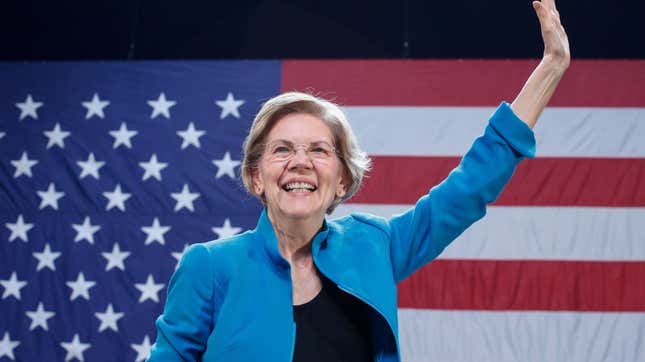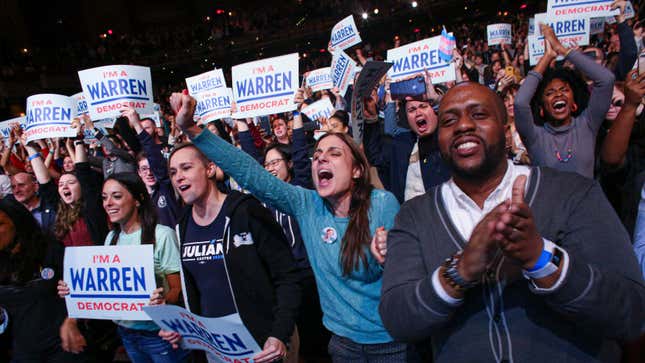

BROOKLYN, NY—As I waited to enter the opulent Kings Theatre in Brooklyn for Elizabeth Warren’s rally with Julián Castro on Tuesday night, I asked the woman standing next to me, dressed stylishly in cheetah-print booties, why she supported Warren’s campaign. She gushed about Warren’s proposal to tax billionaires and her other detailed plans. It was only after I asked her name that I realized I was speaking with Paola Mendoza, the activist and filmmaker who co-founded the Women’s March. Mendoza brushed off concerns about Warren’s perceived loss of momentum in recent weeks. Warren, she told me pointedly, was “electable.”
Warren’s campaign has, from its inception, been dogged by that pesky, sexist question: Can she win? In September of last year, around the time she held a 20,000-person rally in New York City’s Washington Square Park, Warren, whose campaign had entered 2019 with dismal fundraising numbers, seemed to put that question to rest. She began her fall surge, the culmination of a steady upward climb since the beginning of the year, topping the polls in the early nomination states of Iowa and New Hampshire as well as California, and led nationally in some surveys. She appeared to be a candidate who could unify the Democratic party—progressive enough for fans of Bernie Sanders, but one who would never toss off the word “revolution” casually. A reformer to be sure, but a radical one who, as a fellow at the Roosevelt Institute told Jezebel, “knows where the bodies of capitalism are buried.” Friends of mine who are longtime leftist organizers began throwing their support behind Warren, and even my mother—whose main political concerns center around keeping her taxes low and who has never voted in a U.S. election despite my best efforts to drag her to the polls—told me over Thanksgiving that she was a fan, anecdotal evidence that coupled with her polling numbers had me begin seriously thinking about President Elizabeth Warren.

That’s changed. Warren is now fourth in Iowa, behind the three Bs (Joe Biden, Bernie Sanders, and Pete Buttigieg), and similarly lagging in other states and nationwide. Inside Kings Theatre, I ran into a friend who works in politics and who is a fan of both Sanders and Warren. “I think that she began to be attacked from the right, and the left didn’t defend her,” he told me of her decline in the polls. True enough—Pete Buttigieg’s attacks on Warren and Medicare for All, as nauseating as they are, likely worked. It didn’t help, too, that her perceived missteps around the rollout of her plan for Medicare for All dismayed more progressive voters who had begun to warm to her.
Tuesday’s rally then, coupled with her recent media blitz on shows from The View to Meet the Press, was meant to remind us not only of the roots of her political vision, but that she has fans, and lots of them—at Kings Theatre, 3,000 were crammed into the seats and hundreds more waited outside, unable to get in. If the function of a political rally is to both allow the person on stage to bask in the devotion of an adoring crowd, and for the crowd to receive a jolt of communal energy, then it did exactly that—as we all waited for the main event to begin, chants of her name—“Warren! Warren! Warren!”—began spontaneously emerging. Several attendees I spoke to told me her specific brand of pragmatic progressivism were what drew them to her campaign. Jennifer Ambler, a perky 37-year-old campaign volunteer and tax preparer, pointed to Warren’s “progressive ideals” that weren’t “pie in the sky” as her main reason for her enthusiasm. (Buttigieg, funnily enough, was her second choice out of the remaining top candidates.) Avi Glickstein, a 43-year-old freelancer and stay-at-home dad who attended with his child and his wife, echoed Ambler. “If you’re a progressive, it seems like it’s a choice between Bernie and Elizabeth. She’s a progressive and she has plans for everything, but she also seems like she’s willing to address reality. That is really appealing to me,” he said.
But looming over the night like a malaise was the reality of the threat of war. Before both Castro and Warren came on stage, the crowd’s phones dinged with a news alert that an Iranian missile strike had targeted U.S. military bases in Iraq. Suddenly, a full-throated war felt imminent, throwing the festive atmosphere of the rally—the long lines for overpriced beer and wine, the chants, the attempts at kicking off a wave—into a sort of grotesque relief. Warren eventually jogged out to Dolly Parton’s “9 to 5” and took the stage, her arms outstretched. She began the evening by acknowledging the strike. “We have to start on a very sober note,” she said. “But this is a reminder why we need to de-escalate tension in the Middle East.” She added, “The American people do not want a war with Iran.”
It was the only time during the evening that she would address the threat of yet another war; the rest of the event was a rundown of Warren’s greatest hits, a reminder of who she is and what she believes—her personal history growing up, as she often puts it, on the ragged edge of the middle class; the need to tackle corruption through big structural change like her wealth tax and breaking up big corporations and universal childcare and the Green New Deal; her willingness to fight.
“America is in a crisis, and Washington insiders, media pundits, even a lot of people in our own party, don’t want to admit it,” Warren said as she wrapped up. “They think that running some vague campaign that nibbles around the edges of big problems is somehow the safe strategy. They are wrong. If all Democrats can offer is business as usual after Donald Trump, Democrats will lose. We win when we offer the big ideas that match the problems in people’s lives.”
A single vote has yet to be cast, and it’s a sign of how interminable this election season has already been that Warren was essentially saying, Remember me? In his introduction for Warren, Castro called her the candidate who “can unite the entire Democratic party.” “She can appeal to all sides,” he added. That’s what Warren is banking on—Sanders has his base of support which will never waver, but just weeks from the Iowa caucuses, her campaign is pinning its hopes on the fact that enough people are still making up their minds, in a race that has already seen her broaden her base, if tenuously in retrospect, beyond just college-educated white voters.
People cheered. As we streamed out into the rainy evening, a line continued to snake outside the building, groups of people now huddled under umbrellas who were unable to get in but had stayed to get their moment to snap that selfie with their candidate. Smiles abounded, and those around me took out their phones to call Ubers to get home, as the hum of destruction hissed gently in the background like so much white noise.